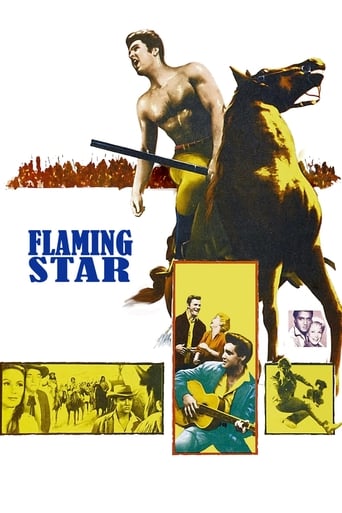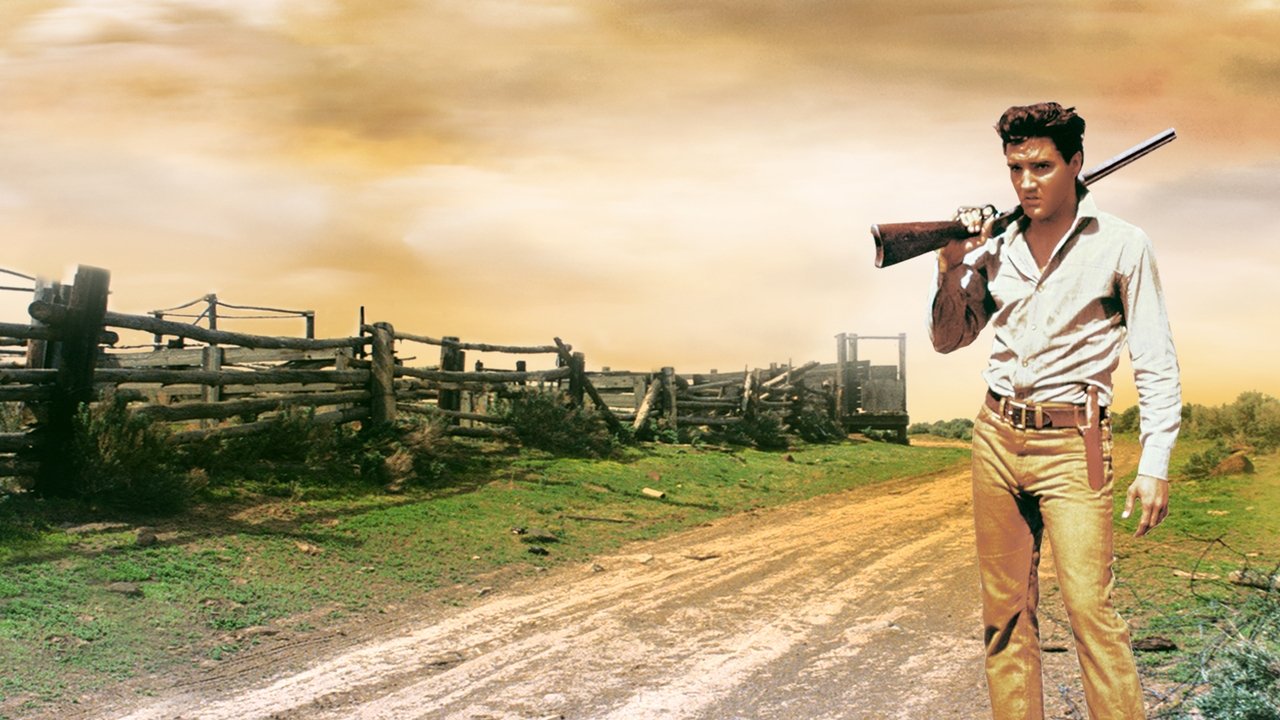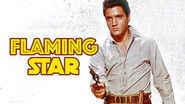zardoz-13
Don Siegel's "Flaming Star" isn't your ordinary, run-of-the-mill, cowboys and Indians horse opera. First, Elvis Presley sings only two tunes. The title tune is an atmospheric ballad, while the second song occurs a birthday party where our hero warbles and strums for his guests and family. Second, this oater doesn't boast a happy ending. Indeed, "Framing Star" serves up lots of anguish during its meager 96 running time. Happily, this oater isn't a routine Elvis songfest with him crooning in every other scene. Third, the sobering drama sets in nine minutes after the Twentieth Century Fox logo when a Kiowa Indian cleaves a man's skull with a war hatchet. In the aftermath, out of the three Howards who are slain only one hand is found, and the hand belonged to Dorothy Howard. The Indians aren't the woebegone bunch that showed up in "Broken Arrow." The Kiowas here are rather merciless with the settlers. As it turns out, Elvis is the half-breed son of a Kiowa woman that his father married after his first wife died. The melodrama grows out of the turmoil that Native Americans stir up when they go on a rampage. Everybody turns against Elvis and his family. Novelist Clair Huffaker adapted his own novel "Flaming Lance" with two-time, Oscar nominated scribe Nunnally Johnson of "Jesse James" and "The Grapes of Wrath" contributing to the plot. The supporting cast is sturdy enough, with John McIntire, L.Q. Jones, Rodolfo Acosta, Richard Jaeckel, and Roy Jenson.The action opens with Clint Burton (Steve Forrest of "North Dallas Forty") and Pacer Burton (Elvis Presley of "Love Me Tender") riding past the camera and down a ridge to the house where they live. Initially, Clint is suspicious because they cannot hear a solitary sound. They enter the house and the people waiting for them inside surprise them. Clint observes that his birthday has been past for a week. Clint's girlfriend Roslyn Pierce (Barbara Eden of "Harper Valley PTA) gives him something that hangs on a wall that he can use when he shaves his face. Tom Howard (L.Q. Jones of "The Wild Bunch") compliments Pacer's mother Neddy (Dolores Del Rio of "The Fugitive") on her culinary skills. Later, when the Howards arrive at their ranch, the Kiowas strike them. They wound Will and bury a hatchet in Tom's noggin. When their father comes out the front door during the attack, he is hit by a flaming arrow in the stomach. Will manages to escape but the next time we see him he is hopelessly delirious. He guns down Two Moons (Perry Lopez of "The Lone Ranger") and mortally wounds Neddy. Pacer has to fake kidnapping Doc Phillips' daughter Dottie so they can take him to see his mother. Pacer and Clint don't Neddy time and they bury on a hill in the shade of a tree. It makes for a very dramatic, emotionally fraught scene. Siegel stages the funeral with the same Spartan grace that he does the showdowns. He shows a comfortable familiarity with the Cinemascope frame. The fight between Clint and Pacer is quietly realistic. Actually, Clint is the most reasonable, heroic, and challenged character of the movie. He exercises commendable restraint when most men wouldn't dare. Elvis is cast as Clint's younger, half-brother Pacer, and he delivers a strong, charisma performance as one of the doomed in this stirring saga.
Spikeopath
Flaming Star is directed by Don Siegel and adapted by Nunally Johnson and Clair Huffaker from Huffaker's own novel Flaming Lance. It stars Elvis Presley, Barbara Eden, Steve Forrest, John McIntire, Dolores del Rio and Rodolfo Acosta. Music is scored by Cyril J. Mockridge and cinematography by Charles G. Clarke.Plot has Presley as Pacer Burton, the son of a Kiowa mother and a white father. The Burton's family contentment out on the Texas frontier is torn apart when a nearby Kiowa tribe begin raiding local homesteads. Pacer soon finds himself caught between two worlds as the neighbourhood white folk he has grown up with turn against him, while the new leader of the Kiowa's, Buffalo Horn (Acosta), courts Pacer for fighting the Kiowa cause.A glorious CinemaScope production in De Luxe color, filmed on location in the San Fernando Valley, Presley's sixth film is one of his best. With the canny Siegel in the directing chair, a very good racism tinged screenplay on the page and Presley playing it straight, Flaming Star has good quality about it. Originally intended as a vehicle for Marlon Brando and Frank Sinatra to play the Burton brothers, Huffaker's story would eventually change titles and put the character focus on the one mixed race brother. Enter Presley, who eager to tackle more serious acting roles than the comedic musicals favoured by his manager Tom Parker, grabbed the opportunity with both hands.With Siegel stripping two songs from the piece, Flaming Star only has one actual musical number in the story (he also sings the title song over the opening credits), and that song, A Cane and A High Starched Collar, comes very early on and well before the narrative turns darker in tone. This opens the film up to the film lover not exactly enamoured with Presley's usual filmic fun and frothery. File it alongside King Creole and Jailhouse Rock as Presley movies with much more to offer from the star for the audience.If you are not with us, you are against us!What unfolds is a tightly constructed Oater that tackles racial themes that were a welcome part of the Westerns scene in the 1950s. It's hardly ground breaking stuff, and the topic had certainly been produced better previously, yet Presley makes the picture bristle with a moving performance that is tinged with a raw, volatile and sexy magnetism. Siegel and the writers insert some complex morality into the story, even an ideological struggle, and Presley rises to the challenge and carries the film with skill. Around him are a few very good performances, notably McIntire (Sam "Pa" Burton), del Rio (Neddy Burton) and Acosta, while Forrest (Clint Burton) improves later in the picture.Inevitably budget restraints affect the production at times, some scenes aren't convincing (a great leap of faith is needed to accept one character's week long crawl through the desert) and the day for night filming is annoying. Arguably more irritating is the fact that some of the characters look like 1960s characters! But the exteriors are gorgeous and Siegel is a dab hand at action scenes, giving us here fist fights, chases, flaming arrow assaults and a good old battle. And with a bitter mood pervading the plot, coupled with an ending that's thankfully bold, there's just too many good things in the picture to let the flaws prevent this being a two thumbs up recommendation. 8/10
Wuchak
"Flaming Star" is a Western hailed as one of Elvis Presley's best serious-acting gigs. It came out in 1960 and was his 6th film in four years.Elvis stars as Pacer, a half-breed, living in the wilderness with his white father (John McIntire) & older brother (Steve Forrest) and Indian mother (Delores Del Rio). Barbara Eden is also on hand as a britches-wearing girl with eyes for Pacer's brother. Things get tense when a band of Kiowas starts attacking settlers and request Pacer's assistance. Aside from the title song over the credits, Elvis only sings one song near the beginning. Beyond that, this is a serious Western with flashes of tragic violence. It's worthwhile for Elvis fans and a few other worthy factors (great wilderness locations, Barbara Eden, etc.), but it's not really a good film.As a Western, "Flaming Star" has too much of what made Westerns in general laughable before the 60s. There are many exceptions, like "The Last Wagon" from 1956, but -- generally speaking -- the downside of Westerns before the 60s include contrived plot elements, an unrealistic vibe, bad music, white actors playing Natives and dumb Indian dialogue. "Flaming Star" is guilty on at least three of these counts.As far as contrived plot elements go, there are just too many "Yeah, right" moments. For instance the guy who survives the Indian raid and hides out in a hole in the desert for days, half-dead and half-mad, just waiting to be used to move along the story. Or the scene where Pacer and his brother threaten a little girl to attain the services of the town's doctor -- they let the girl go BEFORE taking the doctor. Why would the doctor go with them if the girl was no longer in danger? Why wouldn't the town's people attack them once the girl is freed? Or the two cowboys who seek hospitality at Pacer's ranch, would ANYONE really be that rude and savage to two people kindly offering them help, half-breed or not? Bad scripting like this just takes the viewer right out of the story.The white actors in Indian roles present a huge problem visually. How could anyone assume Pacer is an Indian since he looks (and dresses and sings) exactly like a white dude, not to mention the other Indians. Delores Del Rio looks more Hispanic than Native, why assume she's an Indian? Despite this, the Natives are portrayed fairly realistically. What kills it is the lame dialogue they're stuck with, words & phrasing that would make Tonto proud. I couldn't help mimicking such lingo with my wife after the film: "Me Chiefy Wiefy go to front room to listen to pleasant noise while moon lodge high in sky" (lol). At least "Flaming Star" is entertaining in this respect, it's just not the kind of entertainment the filmmakers intended.If you want to catch a great Western from the same period check out Marlon Brando's "One-Eyed Jacks," released in 1961. It's the seminal 60's Western and far superior to most of the Spaghetti Westerns it influenced. What's really interesting is that Brando was originally supposed to play the role of Pacer in "Flaming Star" and the script was later rewritten for Elvis. Marlon, thankfully, chose to invest his time, money and talents into the making of "One-Eyed Jacks." "Flaming Star" was shot in Utah and Thousand Oaks, California, and runs 92 minutes (but seems longer, in a bad way).BOTTOM LINE: "Flaming Star" is worthwhile for Presley fans and a few other factors. It's got a good, serious vibe and is sometimes violent; it also has great wilderness locations. But it's shackled by most of the things that made Westerns eye-rolling experiences before the 60s and 70s (not that all Westerns in the modern era are good, of course). You could sum it up as a curious Elvis-led period piece.GRADE: C-
MarkJGarcia
Flaming Star is a 1960 western film starring Elvis Presley, Barbara Eden and one of Hollywoods first Golden Age beauties, Dolores del Rio who was then about 50 years old. The film was directed by Don Siegel, and had a working title of Black Star. Elvis Presley plays Pacer Burton, the son of a Kiowa mother, played by Dolores del Rio, and a Texas rancher father. His family, including a half-brother, Clint, live a typical life on the Texas frontier. Life becomes anything but typical when a nearby tribe of Kiowa begin raiding neighboring homesteads. Pacer soon finds himself caught between the two worlds, part of both but belonging to neither. The film was released only one month after G.I. Blues but failed to ignite the charts, reaching number 12 on the Variety Box Office survey for the week. Presley's next film, Wild in the Country, also failed to impress fans or critics, and Colonel Tom Parker used this to persuade Presley that his audience didn't want to see him in straight acting roles. This led to musical-comedies such as Blue Hawaii and Kid Galahad, which set the precedent for many of his roles during the 1960s. I gave this movie 7 out of 10, mainly watched it because I wanted to see Dolores del Rio!



 AD
AD






